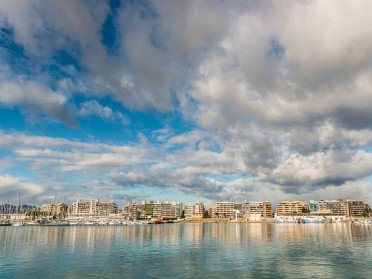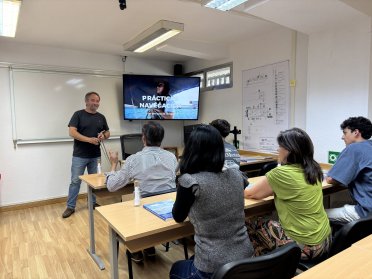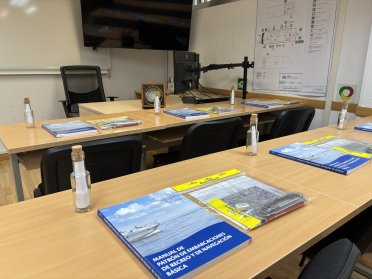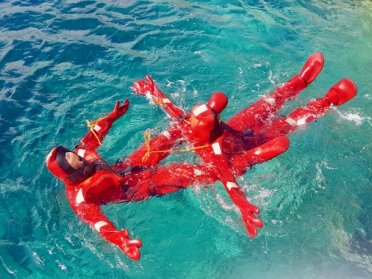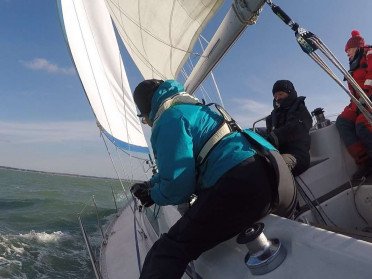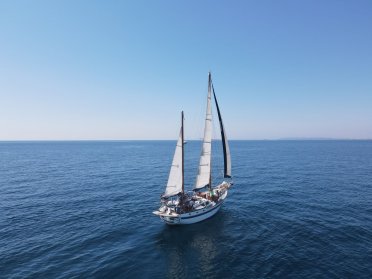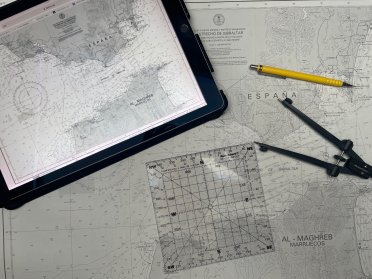Para poder navegar en España es necesario disponer del permiso correspondiente según la normativa vigente. El "PER" o título de Patrón de Embarcaciones de Recreo, es la titulación náutica más popular y demandada ya que es el que nos permitirá llevar embarcaciones más grandes sin necesidad de obtener una titulación previa. Cada años miles de personas obtienen este título náutico.
Si estás pensando hacerte Patrón de embarcaciones de Recreo, en este artículo vamos a darte 10 consejos básicos para que puedas conseguirlo de la mejor forma posible.
-
1. ¿Qué es el PER? Atribuciones del título y habilitaciones opcionales
-
2. ¿Seguro que necesitas el PER? Conoce las alternativas al PER antes de decidirte.
-
3. ¿Qué requisitos tienes que cumplir para sacar el PER?
-
4. Tu primera meta. Elige la fecha para examinarte y no esperes a matricularte.
-
5. ¿Preparo el examen del PER en una escuela o lo estudio por libre?
-
6. Tipos de cursos para obtener el PER
-
7. ¿Cuáles son las claves para aprobar el examen de PER?
-
8. ¿Cuándo conviene hacer las prácticas de PER?
-
9. ¿Me servirá el PER para navegar fuera de España?
-
10. ¿Cuales son las ventajas de reservar el curso de PER en Sailwiz?
1. ¿Qué es el PER? Atribuciones del título y habilitaciones opcionales
El título de Patrón de Embarcaciones de Recreo, PER, es una titulación náutica española que permite llevar embarcaciones de recreo y que está regulada por un real decreto que establece los diferentes títulos de recreo que hay en España.
Con el PER es posible llevar embarcaciones durante el día y la noche, de hasta 15 metros de eslora, alejándonos un máximo de 12 millas de la costa o navegando entre islas del archipiélago Balear o Canario. También nos permitirá llevar cualquier tupo de moto náutica.
Estas atribuciones podrán ampliarse hasta 24 metros de eslora y para la realización de travesías entre la península ibérica y Baleares si se realizan las prácticas de navegación opcionales para obtener esta
ampliación de atribuciones de PER.
Con el PER podremos llevar embarcaciones de motor y también embarcaciones de vela, si realizamos las prácticas correspondientes de habilitación a vela.

PER. Requisitos y atribuciones
2. ¿Seguro que necesitas el PER? Conoce las alternativas al PER antes de decidirte.
El título de Patrón de Embarcaciones de Recreo es la opción que te dará más atribuciones (eslora del barco y distancia de la costa) de las opciones disponibles sin tener ningún conocimiento ni titulación previa. Ahora bien, hay quienes se acaban decantando por una titulación inferior. Antes de ponerte a sacar el PER, al menos deberías conocer las otras opciones.
Si tu idea es comprar o alquilar una embarcación de menos de 6 metros y no tienes intención de navegar nunca por la noche, quizás tengas más que suficiente con la
Licencia de Navegación, antiguamente conocida como "el titulín". Es una licencia que se puede obtener en un día y no requiere aprobar ningún examen.
Si vas a querer navegar por la noche, o vas a querer alejarte un poco más de la costa, la Licencia de Navegación te permite solo dos millas, o quieres llevar embarcaciones un poco mayores de 6 metros, con el título de
Patrón de Navegación Básica podrás llevar barcos de hasta 8 metros y navegar de día y de noche hasta 5 millas de la costa.
En todo caso, si ahora o en el futuro tienes pensado navegar en embarcaciones más grandes o a una distancia mayor, nuestra recomendación es que empieces por el PER directamente, que es lo que hace la mayoría de la gente, y a la larga es más barato y sencillo.
Y si quieres realizar navegación de altura en embarcaciones de hasta 24 metros podrás obtener el título de
Patrón de Yate, que te permitirá alejarte hasta 150 millas de la costa, o podrás obtener el título de
Capitán de Yate, que no tiene límite y te permite navegar a la distancia que quieras. Para tener el título de Patrón de Yate hay que obtener antes el PER, y para obtener el título de Capitán de Yate, tendrás que obtener antes el título de Patrón de Yate.
3. ¿Qué requisitos tienes que cumplir para sacar el PER?
Para obtener el PER deberás cumplir una serie de requisitos. En primer lugar, deberás tener los 18 años cumplidos en la fecha en la que vayas a realizar el examen teórico y tendrás que superar un reconocimiento psicofísico en un centro autorizado, se trata de un reconocimiento similar el que se pide para el carné de conducir de coches. Este reconocimiento lo harás al final, cuando hayas superado las pruebas y prácticas necesarias, que son:
- Un examen teórico tipo test de 45 preguntas en el que podrás fallar como máximo 13 preguntas del total. Tampoco podrás tener más de 2 fallos en las 5 preguntas del tema de Balizamiento, no podrás tener más de 5 fallos en las 10 preguntas del tema de Reglamento y no podrás tener más de 2 fallos en las 4 preguntas sobre cartas de navegación.
- Deberás realizar unas prácticas básicas de seguridad y navegación, que a menudo suelen llamarse "Prácticas de PER a motor". Se denominan así para diferenciarlas de las prácticas de habilitación a vela. Estas prácticas constan de 16 horas y se realizan en 4 salidas de 4 horas cada una. Normalmente se hacen en dos días.
- También deberás realizar el curso de radio operador de corto alcance (ROCA), que consta de una clase teórica de 4 horas y dos sesiones prácticas de radiocomunicaciones de 4 horas cada una.
Superados todos estos requisitos y con los certificados que lo acreditan podrás solicitar tu título de Patrón de Embarcaciones de Recreo. Podrás hacer dos prácticas más, por separado o combinadas, que te permitirán ampliar las atribuciones del PER:
- Si quieres llevar embarcaciones a vela, deberás realizar unas prácticas de navegación a vela de 16 horas, que constan de 4 sesiones de 4 horas cada una y se suelen hacer en dos días.
- Si quieres llevar embarcaciones de hasta 24 metros y poder realizar navegaciones entre la península y las islas Baleares, deberás realizar una práctica en travesía que consta de 24 horas seguidas navegando, sin tocar puerto.
Las dos prácticas anteriores (Vela y ampliación de atribuciones) se pueden realizar conjuntamente en una travesía de 48 horas seguidas, sin tocar puerto durante toda la navegación.
Consulta todos los cursos y prácticas de PER disponibles en Sailwiz
4. Tu primera meta. Elige la fecha para examinarte y no esperes a matricularte.
La mejor forma de "forzarnos" a preparar el examen teórico es empezar matriculándonos en el examen. Existen varias convocatorias de exámenes de PER al año que establecen las administraciones competentes en cada comunidad autónoma. Puedes consultar las fechas oficiales de toda España en la web
www.examenesdenautica.com, desde donde también puedes realizar la matrícula en la fecha que te interese.
Una vez que te hayas matriculado planifica tu estudio y trata de reservar tiempo todas las semanas para hacer tests de cada tema. Intenta reservar un poco más de tiempo las dos últimas semanas antes del examen para hacer todos los simulacros de examen que puedas.
El temario del PER no es muy complicado, requiere algo de tiempo asimilarlo, pero está al alcance de cualquiera. Es importante que practiques bastantes tests porque a veces hay preguntas algo complicadas y aunque conozcas el temario algunos enunciados pueden confundir.
En cuanto a dónde examinarte, es habitual encontrar en foros de Internet opiniones sobre si el examen es más fácil en un lugar u otro. El programa oficial es el mismo en todo el país y nuestra recomendación es no dejarse llevar por estas opiniones ya que basta que le hagamos caso para que justo en nuestra convocatoria el tribunal ponga un examen más dificil de lo habitual. Lo mejor es matricularnos en el que nos venga mejor por fecha y localización y preprarlo bien.
5. ¿Preparo el examen del PER en una escuela o lo estudio por libre?
Esta es una pregunta típica y la respuesta es "Depende". Nuestro consejo es que analices el tiempo del que dispones y tu capacidad de hábito de estudio. La ventaja de asistir a una escuela es que te marcan un ritmo de estudio para llegar preparado al examen, los profesores conocen donde fallan más los alumnos y te guian mejor y además, siempre es más llevadero estudiar junto con otros compañeros de clase.
La ventaja fundamental de estudiarlo por libre es que te ahorrarás el dinero de las clases teóricas y si estás acostumbrado a estudiar puedes prepararlo por tu cuenta. Aún preparándolo por libre, puedes encontrar cursos online a precios interesantes para tener el apoyo de algún profesor a distancia y contenidos para preparar el examen más avanzados que un simple manual.
Si tienes dudas siempre puedes empezar preparándololo por tu cuenta leyendo algún libro y si ves que los vas dejando, apuntarte a una escuela.
6. Tipos de cursos para obtener el PER
Las escuelas náuticas ofrecen diferentes modalidades de cursos teóricos para preparar el examen del PER. Estás son algunas de las más habituales:
- Cursos presenciales de PER: Son los cursos más habituales, que suelen impartirse en el aula de la escuela en diferentes horarios a lo largo de la semana. La duración de estos cursos puede ser de cuatro a nueve semanas, dependiendo de las horas de clase que se impartan cada semana.
- Cursos presenciales intensivos de PER: Son cursos donde se concentra la formación en muy pocos días, por ejemplo en un fin de semana de viernes a domingo. Los alumnos reciben toda la formación durante dos o tres días seguidos, dando clase hasta 8 horas diarias.
- Cursos de PER a bordo: Los cursos "a bordo" consisten en una modalidad que combina la teoría con la práctica a bordo de un barco escuela. Tiene el atractivo de que la formación teórica se imparte en el mismo barco y la tarifa del curso suele incluir el alojamiento a bordo. Suelen durar entre 5 y 7 días.
- Cursos de PER online: Existe la posibilidad de preparar el examen de Patrón de Embarcaciones de Recreo a distancia y la mayoría de las escuelas se sirven de plataformas online o consultas a través de mensajería electrónica.
- Cursos de PER a domicilio: Si queremos una preparación del examen personalizada, siempre podemos llamar solicitar la posibilidad de que un profesor se desplace a nuestra oficina o domicilio.
- Cursos de PER para colectivos o empresas: También es habitual juntar un grupo de colegas en la empresa y solicitar que nos organicen el curso en las oficinas de nuestra compañía o club.
7. ¿Cuáles son las claves para aprobar el examen de PER?
El examen del PER no es muy complicado de aprobar, pero requiere algo de tiempo de estudio. Muchos de los que empiezan le tienen miedo a los ejercicios de carta de navegación, pensando que serán complejos problemas matemáticos. Lo cierto es que para comprender la mecánica de estos ejercicios tan solo hay que saber sumar y restar. De los cuatro ejercicios que hay de carta basta con tener dos bien para superar ese bloque. Por tanto, las cartas no son el mayor problema.
La llave del aprobado suele estar en las 15 preguntas de Balizamiento y Reglamento, en las que solo podemos cometer, entre las dos un máximo de 7 fallos. Quienes supenden el examen teórico de PER suele ser a menudo por superar los fallos permitidos en este bloque. Y es que esta parte del temario es, de hecho, la parte más antipática del programa, ya que nos requerirá un poco más de esfuerzo de memorización. Pero en todo caso, nada que no esté al alcance de cualquiera.
Aunque hay tiempo más que suficiente para realizar el examen, al hacer el examen conviene empezar respondiendo las preguntas de los bloques eliminatorios al principio.
8. ¿Cuándo conviene hacer las prácticas de PER?
Antiguamente el contenido del examen teórico era común con algunos de los ejercicios que se realizaban en las prácticas y por tanto convenía hacer las prácticas antes del examen, ya que servían como preparación.
Actualmente el examen teórico tiene un programa más reducido y todo lo que se hace en las prácticas no se pregunta en el examen, por lo que ya no tiene tanto interés hacer las prácticas antes del examen, aunque si decidimos hacerlo así, siempre podemos aprovechar este tiempo para consultar alguna duda con el instructor.
La legislación dice que entre la fecha del examen aprobado y las prácticas no puede haber más de 24 meses de diferencia, pudiendo hacerlo en el orden que queramos.
9. ¿Me servirá el PER para navegar fuera de España?
En la actualidad no existe una legislación internacional que reconozca los títulos náuticos españoles en el extranjero. En la práctica no suele haber problemas y la mayoría de los paises de nuestro entorno permiten a los españoles navegar con los títulos náuticos de España y la gran mayoría de las agencias de alquiler no nos pondrán problemas para alquilar un barco.
Si queremos disponer de un título con más reconocimiento internacional, es recomendable realizar un curso de una escuela homologada por la Royal Yachting Association, que es el organismo que expide certificados de cursos náuticos con más reconomiento internacional.
10. ¿Cuales son las ventajas de reservar el curso de PER en Sailwiz?
Sailwiz selecciona las mejores escuelas náuticas de recreo en España. Las ventajas de reservar tu curso en Sailwiz son:
- Precio mínimo garantizado. Las escuelas están obligadas a igualar su mejor oferta en Sailwiz.com
- Reintegro para otros planes. Al reservar en Sailwiz tu curso recibirás millas que podrás canejar en futuras reservas de otros planes para navegar en Sailwiz.
- Reserva rápida: Podrás hacer todo el proceso online, sin tener que desplazarte a la escuela.
- Tu dinero a salvo. Si la escuela anulase el curso o la práctica por falta de alumnos o mala meteorología Sailwiz te reintegra el 100% sin que tengas que pelearte con la escuela por el reembolso.
- Escuelas náuticas de prestigio. Solo trabajamos con escuelas náuticas homologadas y todos los usuarios reciben un correo para valorar el curso o la práctica que realicen para conocimiento del resto de usuarios de la plataforma. No suele ocurrir, pero en el pasado hemos tenido que dar de baja alguna escuela por operar de forma incorrecta.
-
Álvaro García
CEO y cofundador de Sailwiz. Emprendedor, informático, buceador y navegante. Trabajo para convertir la náutica en turismo accesible para todo el mundo.
Sígueme en LinkedIn
¿Qué te ha parecido este artículo?
La valoración media es de 4,6/5





